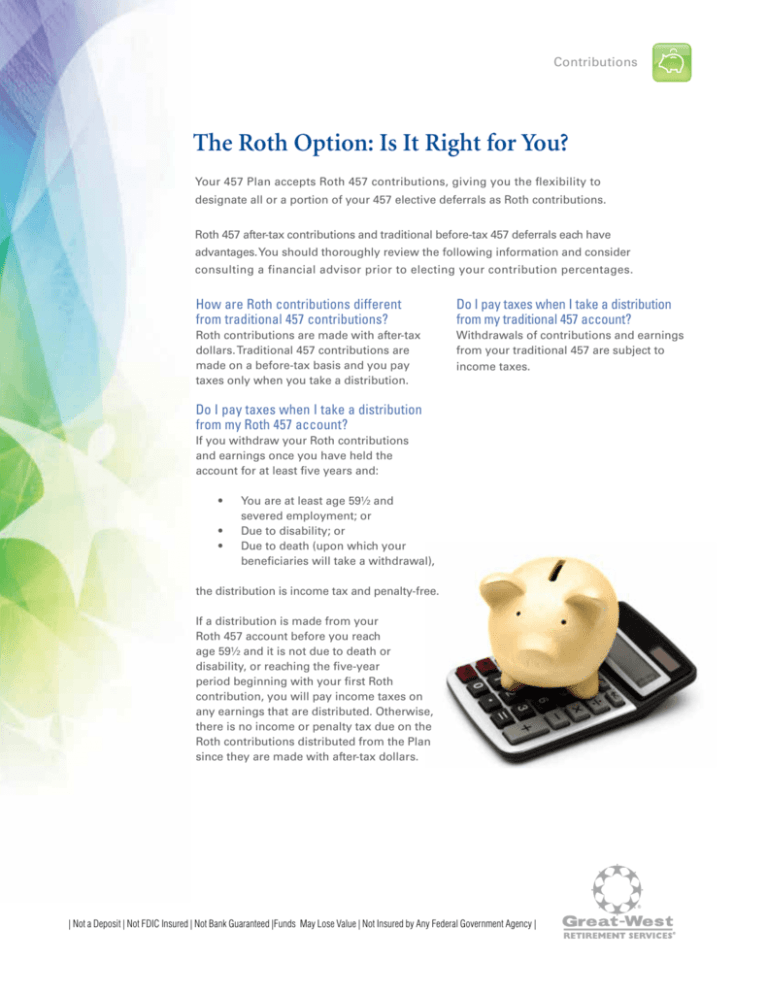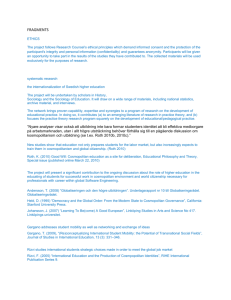
Contributions
The Roth Option: Is It Right for You?
Your 457 Plan accepts Roth 457 contributions, giving you the flexibility to
designate all or a portion of your 457 elective deferrals as Roth contributions.
Roth 457 after-tax contributions and traditional before-tax 457 deferrals each have
advantages. You should thoroughly review the following information and consider
consulting a financial advisor prior to electing your contribution percentages.
How are Roth contributions different
from traditional 457 contributions?
Do I pay taxes when I take a distribution
from my traditional 457 account?
Roth contributions are made with after-tax
dollars. Traditional 457 contributions are
made on a before-tax basis and you pay
taxes only when you take a distribution.
Withdrawals of contributions and earnings
from your traditional 457 are subject to
income taxes.
Do I pay taxes when I take a distribution
from my Roth 457 account?
If you withdraw your Roth contributions
and earnings once you have held the
account for at least five years and:
•
•
•
You are at least age 59½ and
severed employment; or
Due to disability; or
Due to death (upon which your
beneficiaries will take a withdrawal),
the distribution is income tax and penalty-free.
If a distribution is made from your
Roth 457 account before you reach
age 59½ and it is not due to death or
disability, or reaching the five-year
period beginning with your first Roth
contribution, you will pay income taxes on
any earnings that are distributed. Otherwise,
there is no income or penalty tax due on the
Roth contributions distributed from the Plan
since they are made with after-tax dollars.
| Not a Deposit | Not FDIC Insured | Not Bank Guaranteed |Funds May Lose Value | Not Insured by Any Federal Government Agency |
Contributions
How do Roth 457 after-tax contributions affect my take-home pay?
Roth 457 contributions reduce your take-home pay because you pay taxes
on your Roth 457 contribution up front, rather than deferring those taxes
until you take a distribution.
For example, let’s assume you earn $40,000 annually and pay income tax
at the assessment rate of 15%. If you contribute $5,000 before tax to a
traditional 457 plan, you don’t pay income tax on the $5,000 contribution.
Your take-home pay is $29,750, which is greater than it would be if
you had made an after-tax contribution. If you make a $5,000 Roth 457
contribution, you pay income taxes on that $5,000 immediately. Assuming
a 15% tax rate, your take-home pay is only $29,000. That amounts to $750
less in take-home pay when you contribute to the Roth 457 account.
Before-Tax 457
Roth After-Tax 457
Annual Salary
$40,000
$40,000
Minus Before-Tax Contributions
$5,000
$0
Taxable Pay
$35,000
$40,000
Minus Estimated Income Tax
$5,250
$6,000
Minus After-Tax Contributions
$0
$5,000
TAKE-HOME PAY
$29,750
$29,000
FOR ILLUSTRATIVE PURPOSES ONLY. This illustration does not take into account Medicare, Social Security, state or local income taxes.
How much can I contribute?
The maximum combined contribution limit in 2011 is $16,500. If you are age 50
or older, you can make additional “catch-up” contributions of $5,500. If you are in
the three years ending prior to the year you attain normal retirement age under
the plan you may be able to contribute up to $33,000 in 2011, called special
catch-up contributions. The amount you are able to contribute is based on you
amounts you were eligible to contribute to the 457 plan in previous years but did
not. The age 50 or older catch-up and the special catch-up contributions may not
be used in the same year.
How does the Roth 457 differ from a Roth IRA?
• Contribution Limits
Roth IRA contributions are limited to $5,000 in 2011 (or $6,000
if you are age 50 or older) versus $16,500 for the Roth 457 (or
$22,000 if you are age 50 or older). So, you can contribute more
on an after-tax basis to your Roth 457 than to a Roth IRA.
• Eligibility
If you’re single and earn more than $122,000 a year or are
married with a joint income of more than $179,000 in 2011, you
aren’t eligible to contribute to a Roth IRA in 2011. However, if
you meet your Plan’s eligibility requirements, you can participate
in the Roth 457 Plan regardless of your income.
*Age 50+ may not be available for certain types of 457 plans. Additionally, participants in certain types of 457 plans may be eligible
for special catch-up contributions.
Contributions
Can I roll over my account if I change employers?
Should you leave your current employer, you still have the option of rolling over
your Roth 457 account to a Roth IRA or to a 457, 401(k) or 403(b) plan that has
a designated Roth account and accepts Roth rollovers. You can roll over your
traditional 457 account to any eligible traditional IRA, Roth IRA, governmental 457
plan, 403(b) plan or qualified 401(k) plan that accepts rollovers.
Can I leave my money in my Roth 457 indefinitely?
Once you reach age 70½, the government requires that you begin taking minimum distributions.
AT-A-GLANCE COMPARISON
Before-Tax 457
Roth After-Tax 457
Is my contribution taxable
in the year I make it?
No
Yes
Is my contribution taxed
when distributed?
Yes
No
Are the earnings on my
contributions taxed when
distributed?
Yes
No, provided the distribution
occurs after age 59½, death
or disability and no earlier
than five years after your first
Roth 457 contribution
If I change jobs, can I roll
over my account?
Yes, to a governmental
457 plan, traditional IRA,
Roth IRA, 403(b) plan or
qualified 401(k) plan if
the plan allows it
Yes, to a Roth IRA, 457,
401(k) or 403(b) plan if
the plan has a designated
Roth account and accepts
rollovers
What is the maximum
Combined limit for contributions in 2011: $16,500 or
$22,000, including the additional $5,500 Age 50+
Catch-Up contributionup to $33,000 in 2011 if eligible for
special 457 catch-up contributions. The age 50 or older
catch-up and the special catch-up contributions may
not be used in the same year.*
amount I can contribute?
If I experience an
unforeseeable emergency,
can I make a withdrawal?
Yes, if your Plan allows
unforeseeable emergency
withdrawals
Yes, if your Plan allows
unforeseeable emergency
withdrawals
Do I have to take a minimum
distribution at age 70½?
Yes
Yes
*Age 50+ may not be available for certain 457 plans. Additionally, certain 457 plans may not allow special catch-up contributions.
Contributions
Making the Best Choice for You
You will have to determine whether contributing to your Plan on an after-tax
Roth basis or a traditional before-tax basis makes more sense for your situation.
The Roth 457 option essentially “locks in” today’s tax rates on all contributions. For
some people—especially those who expect to be in a higher tax bracket when they
retire—the Roth 457 option may make the most sense. If you’re one of
those people, the Roth option allows you to pay taxes on your contributions
when they are contributed (presumably at a lower tax rate than you would
expect to pay at retirement).
If you expect to be in a lower tax bracket when you retire, you might want to
consider contributing to your 457 on a before-tax basis. You won’t pay taxes
on your contributions or any earnings on your contributions until you take a
distribution, which is usually at retirement (when many people expect their
retirement earning power and tax burden to be lower than it is today).
The Bottom Line: Participate!
Regardless of which type of contributions you choose, the important thing is to contribute as
much as you can today for your retirement tomorrow. If after you’ve done your research and
consulted the experts you decide that Roth 457 contributions are right for you, you can make
the appropriate changes to your account by completing a Salary Deferral Agreement form
available from your employer’s human resources department, or by visiting your Plan’s website
or calling KeyTalk®.1 If you are not currently enrolled in your Plan, you can elect to make Roth
457 contributions by completing your Plan’s enrollment form.
For more information, contact a Great-West Retirement Services® representative at
(713)-426-5588 or (877) 313-7693.2
1 Access to KeyTalk and the Website may be limited or unavailable during periods of peak demand, market volatility, systems upgrades/
maintenance or other reasons.
2 Representatives of GWFS Equities, Inc. are not registered investment advisers, and cannot offer financial, legal or tax advice. Please consult with
your financial planner, attorney and/or tax adviser as needed.
Securities, when offered, are offered through GWFS Equities, Inc. and/or other broker dealers.
Great-West Retirement Services ® refers to products and services provided by Great-West Life & Annuity Insurance Company, FASCore, LLC
(FASCore Administrators, LLC in California), First Great-West Life & Annuity Insurance Company, White Plains, New York, and their subsidiaries
and affiliates. Great-West Life & Annuity Insurance Company is not licensed to conduct business in New York. Insurance products and related
services are sold in New York by its subsidiary First Great-West Life & Annuity Insurance Company. Other products and services may be sold in
New York by FASCore, LLC. GWFS Equities, Inc. is a wholly owned subsidiary of Great-West Life & Annuity Insurance Company and an affiliate
of FASCore, LLC (FASCore Administrators, LLC in California) and First Great-West Life & Annuity Insurance Company, White Plains, New York.
Great-West Retirement Services ®, KeyTalk ®, and the Partnership Logo ® and its design elements are registered trademarks of Great-West Life &
Annuity Insurance Company. ©2011 Great-West Life & Annuity Insurance Company. All rights reserved.Form# Roth457 Overview (04/2011)
PT120566





